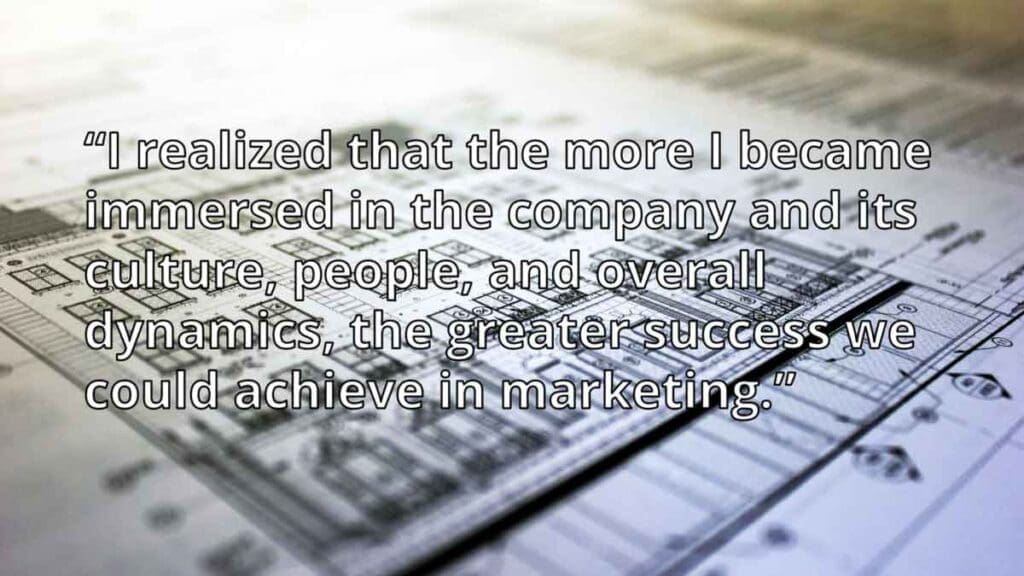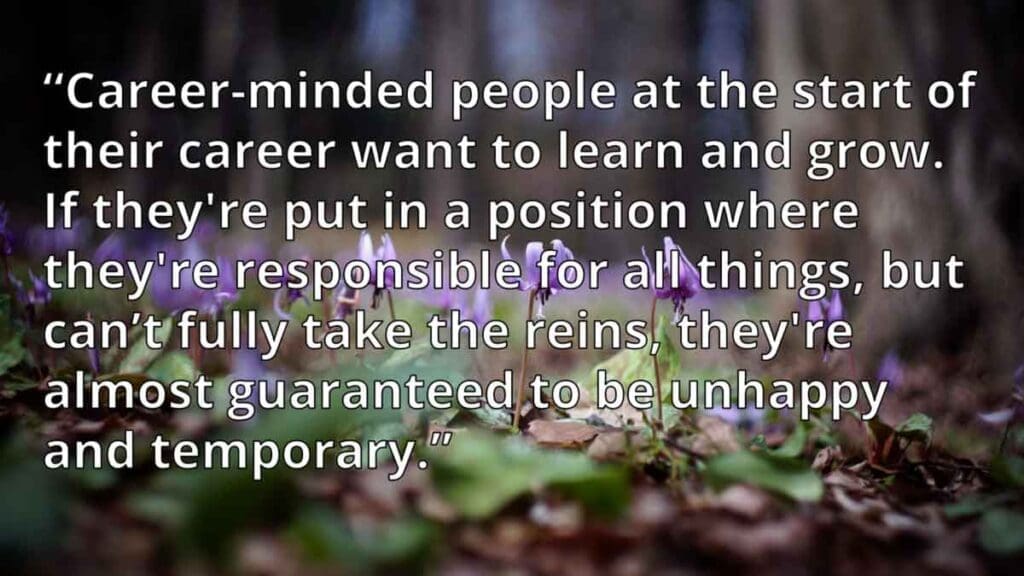B2B Marketing Planning: Interview With a Fractional CMO
This is the first of our blog series entitled “What’s New in B2B Marketing Planning: Interviews with Thought Leaders.” In this kickoff, we talk to Debra Andrews, the President and Owner of Marketri, for some insight into her experience as a Fractional CMO.
Can you describe the path you took to becoming a Fractional CMO?
Debra Andrews: A few years ago, one of my clients wanted to bring me in-house as a full-time hire. But I decided I couldn’t focus on growing Marketri while taking on another full-time job. I still wanted to help, so we worked out a role at the company that’s now what we call a Fractional CMO position. It was an embedded sort of marketing leadership and consulting role. I had a company email address and was considered an extension of their company.
We continued the relationship for eight years, and because it was so successful, I decided to try the Fractional CMO role with another client. I realized that the more I became immersed in the company and its culture, people, and overall dynamics, the greater success we could achieve in marketing.
At that point, I formally added Fractional CMO to Marketri’s service offerings.
What are your main responsibilities as a Fractional CMO in terms of B2B Marketing Planning?
Debra: One of the most important aspects of my role is to make sure the overall upfront messaging is clear and concise, so the firm is differentiated in a meaningful way. I also look at their top-level goals and growth objectives – whether they are growing certain services or promoting certain packages or products – and ensure the company has a plan in place that supports them.
B2B marketing planning is always a part of the work, and that usually means creating a strategic marketing plan for the company.

Does that include budgeting?
Debra: That’s all part of the marketing planning process. Anything in the strategic marketing plan will be priced out in terms of budget – even salaries.
I create very actionable plans that zoom from 10,000-foot goal-setting down to who will do what and by when. That means reviewing the resources the company has, from financial and talent standpoints, and making sure the marketing strategy fits within their overall budget. This often requires building a marketing department from scratch or staffing their existing (and typically very lean) marketing department. I figure out what hires they need to make, both in-house and outsourced; create job descriptions for new positions; and guide the entire hiring process. While I’m in the Fractional CMO role, all in-house marketing personnel report to me, and I oversee their development and career progression.
So a Fractional CMO can help in hiring junior-level marketing team members?
Debra: Sure. People who think they have a grasp of basic marketing are often surprised by how specialized and complicated the marketing field has gotten. And it’s really hard to hire for a position when you don’t understand what you are hiring for.
A really common mistake is hiring for everything in one junior-level marketing person. Career-minded people at the start of their career want to learn and grow. If they’re put in a position where they’re responsible for all things, but can’t fully take the reins, that poor marketing coordinator is almost guaranteed to be unhappy and temporary. The sad thing is, that outcome doesn’t have much to do with their potential, or their fit. They often could have been a great fit. They just needed someone with marketing experience to mentor them, answer their questions, and help with their development.
How should a client who currently does not have any (or much) in-house marketing prepare for the start of a Fractional CMO engagement?
Debra: I recommend that they really think through what they want to achieve with their company. That will guide any actions a Fractional CMO will take. They should have already done some strategic planning prior to engaging a Fractional CMO. They should know if they’re trying to climb a molehill, mountain, or Mount Everest. That way, when someone like me joins as a Fractional CMO, they can hit the ground running, and build a roadmap to conquer that uphill climb.
The company should also determine what budget they are willing to attribute to marketing. That way, the Fractional CMO can determine what needs to be accomplished in-house, and what they should outsource to vendors.

Does a Fractional CMO work with a lot of vendors?
Debra: Definitely. We work very differently than most creative agencies, which typically work on a project-by-project basis and aim to earn a profit on each one. As a Fractional CMO, I’m a long-term advocate negotiating on the client’s behalf for the best value. If my clients don’t have a preferred vendor in mind, I reach out to Marketri’s network of vendors. I’ve built a relationship with those vendors over the years, and we have many shared success stories.
Here’s the truth: Those vendors understand that I can potentially refer them a lot of business, so they can get competitive with their pricing. Which I can then pass onto the client. Everyone wins in that situation.
Knowing the vendors matters when the client gets into execution, because at that point, there’s a lot of moving parts. The Fractional CMO becomes the one point-of-contact for all the tactical portions of the strategy. And we usually handle the company’s single marketing invoice. So I know exactly what graphic design, videography, copywriting, and website development should cost. Clients really like that. There’s such a variety of agency models and price ranges out on the market today that it can be very overwhelming for a non-marketing executive.
What do clients say they most appreciate about having you as their Fractional CMO?
Debra: A lot of companies struggle with marketing for a long time. They bring in various people or hire agencies, and nothing pans out. And many times, they resent the bad experiences. Best-case scenario, they remain neutral in their opinion on marketing.
Growth-minded companies tend to get frustrated because they see what successful companies are doing. They don’t know what to do, or how to imitate those successful companies. When they have a Fractional CMO who can remove that burden, it’s a big relief. Now they have someone who can plot a course and answer questions.
It’s really helpful to have a Fractional CMO as a member of the executive team, collaborating with the other divisional department heads, like Sales and IT, to ensure goals are aligned across departments and with the company’s overall goals. In those conversations, I answer marketing questions that may have gone unanswered before. Questions like:
- What’s needed in order to do the marketing we need to do?
- What technology stack do we need to put in place?
- Do we want marketing automation software or a CRM?
- How are we going to measure results?
But if I had to sum it up, I think clients most appreciate having someone say, “Trust me, I can take care of all of this for you.”
Have you heard of many companies employing a Fractional CMO?
Debra: No – this idea is still in its infancy. It’s a new model, and I don’t think a lot of companies are aware of it.
But we’re committed to the model. It’s an ideal fit for the middle market, specifically in B2B companies. It doesn’t make sense for them to hire a CMO with a salary ranging anywhere from $250K-$300K. They just need to get started. They need access to marketing leadership and strategy. They need to see the value in strategic marketing. And it’s fun to be a part of that.

What does a typical Fractional CMO engagement cost?
Debra: The range depends on a few different things. How aggressive is the client with their marketing? Where are they in the lifecycle of their marketing? Do they have in-house marketing personnel in place?
The pricepoint depends on exactly how much experience a client is looking for, or what niche they are looking to fill, but it is usually between $200-$300 per hour. I recommend starting with a six-month contract. Marketing results are not instantaneous, so anything less than six months won’t prove worthwhile to me or the client. Typically, clients retain me as a Fractional CMO for three to four days per month. That doesn’t mean I spend entire days devoted to them; those hours are spread out over the course of the month.
One of the beauties of this model is its flexibility – you can scale up or down over time. So I have done as little as two, and as many as 15, days per month for a client. In the first year, it will be more aggressive, and then, if a client is not as growth-minded after a year, they might reduce the engagement.
Does a Fractional CMO need to be in-person at the client’s location or can they work as a remote employee?
Deb: Typically, they work as a remote employee, since they are contracted for a limited number of hours per month. They’ll want to make sure most of that time is spent marketing and not traveling.
But in the first few months of the engagement, it is important to have some face-to-face time to build a rapport with the team. And it’s always important to attend sales meetings and executive meetings. You cannot be an island within an organization. You need to be inter-connected within the organization and between teams or divisions.
What do you enjoy most about your role as a Fractional CMO?
Debra: After all the upfront legwork is done – the messaging is in place, the technology is in place, the staffing is in place, the brand is in place, and the company is well-positioned – you have a strong foundation on which to build. And you get to start the outreach.
The excitement builds from this point, whether it’s a simple service campaign or a more complex one that’s going after a particular vertical market. We’re now actually executing the strategy. I love the moment, usually around this time, when I see the client start to really get it.
I’ve heard this sentiment countless times: “I get what marketing can do for my company today. I never got it before, but now I understand.” Or, “I’ve been throwing money at marketing for 20 years and never had any idea where that money was going. Now I get it, and it’s paying off.”
It’s really great to see that realization. I never get tired of it.
Thanks for reading!
Want to learn more? A Fractional CMO often creates a strategic marketing plan as a roadmap for how marketing will contribute to a company’s overarching goals. If you want to learn more about marketing plans, you can download our free ebook below!

Check out these recent insights from our subject matter experts.





